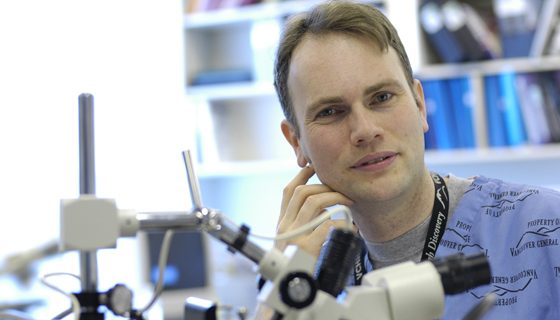Women with particularly aggressive forms of breast cancer could be identified by a test that predicts whether the disease is likely to spread to the brain.
Torsten Nielsen, a Professor in the Department of Pathology and Laboratory Medicine, co-led an analysis of almost 4,000 breast cancer patients, finding that high activity of a gene called alpha beta (αB)-crystallin could pick out women who were at greater risk of developing secondary brain tumours. Women whose breast cancer had begun to spread and who tested positive in the αBcrystallin test were three times more likely to have disease that spread to the brain than those who tested negative.
Women can live for years with breast cancer that has begun to spread around the body – but the exception is spread to the brain, which usually indicates a woman is in her last few months of life.
The study, published in Breast Cancer, was a collaboration with the Institute of Cancer Research in London (U.K.), the University of North Carolina at Chapel Hill and the University of Wisconsin-Madison, and funded by the Breast Cancer Research Foundation, the U.S. National Cancer Institute, Cancer Research UK and the Canadian Breast Cancer Foundation.
In the study, the researchers analyzed 969 breast cancer tumours which ultimately spread to new sites in the body, from a database of almost 4,000 breast cancers from the BC Cancer Agency. 141 had spread first to the brain. Some 127 scored positive for αB-crystallin, and 842 scored negative – with those testing positive three times more likely to have spread first to the brain.
In a further analysis of all 4,000 cases, αB-crystallin was also linked with a significantly higher risk of death – with 36 per cent of women with αB-crystallin positive cancer, compared to 25 per cent with αB-crystallin negative, dying within ten years of diagnosis.
“It has taken us years to assemble the clinical outcome database and tissue samples, generate the immunohistochemical biomarkers, gene expression profiles and analyse the data for this study – and we were delighted to find a definite link between alpha beta crystallin and breast cancer progression, which we hope will ultimately improve clinical outcomes,” says Dr. Nielsen, a pathologist at the BC Cancer Agency.
